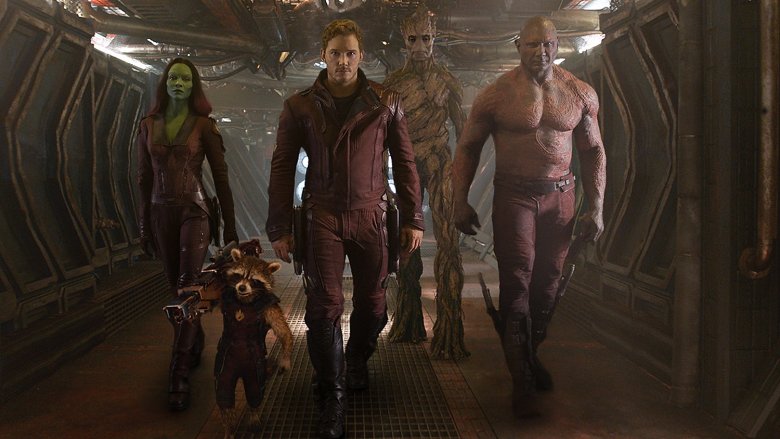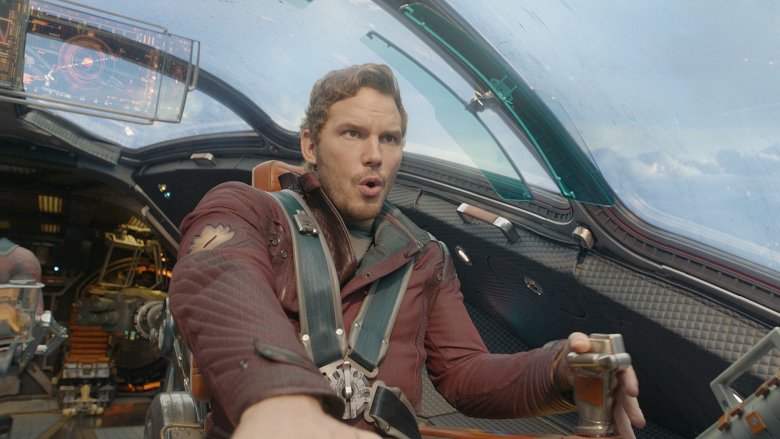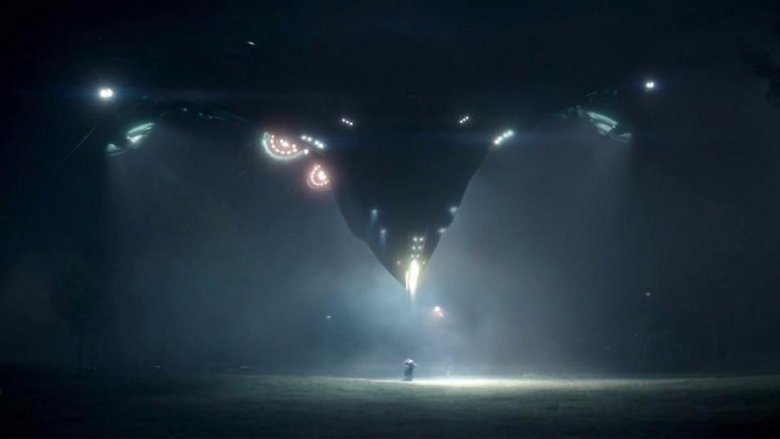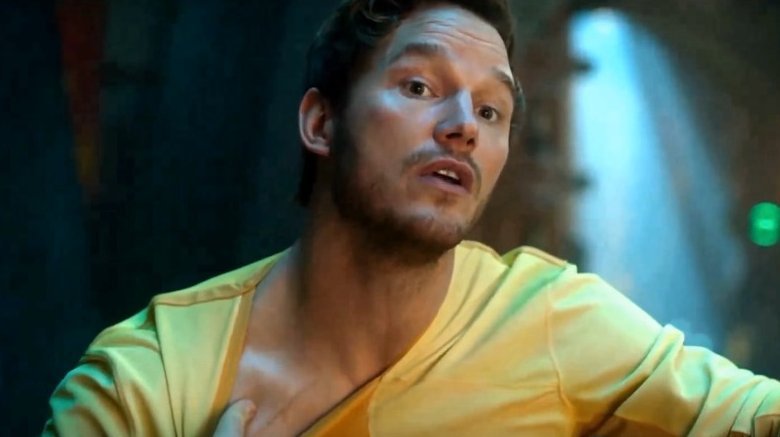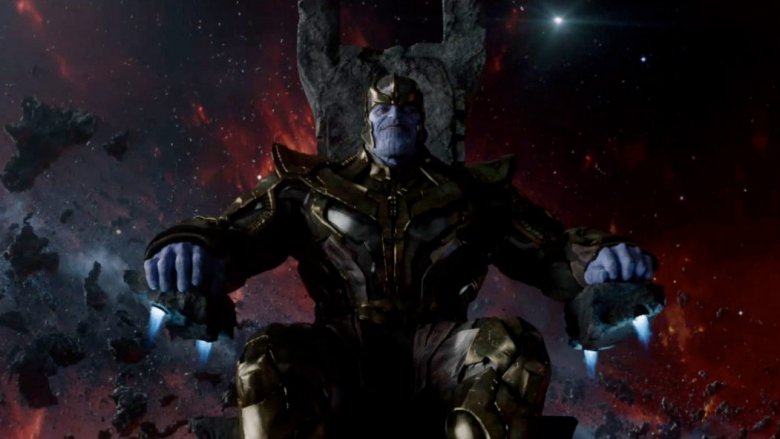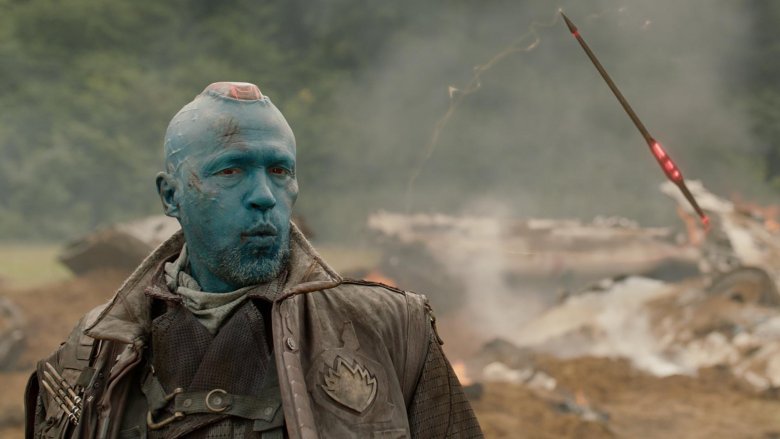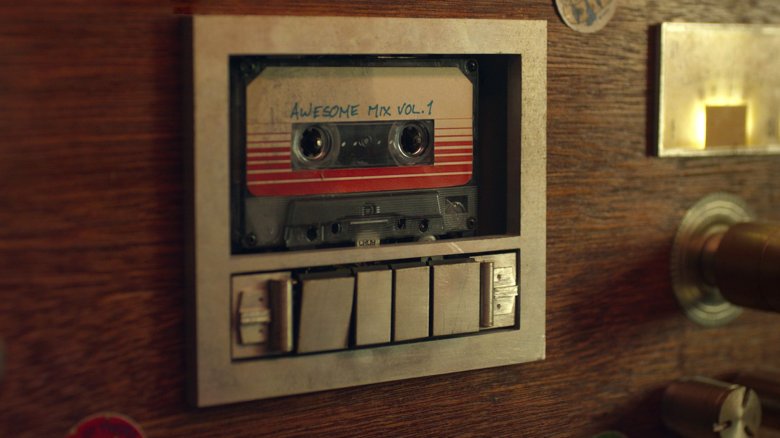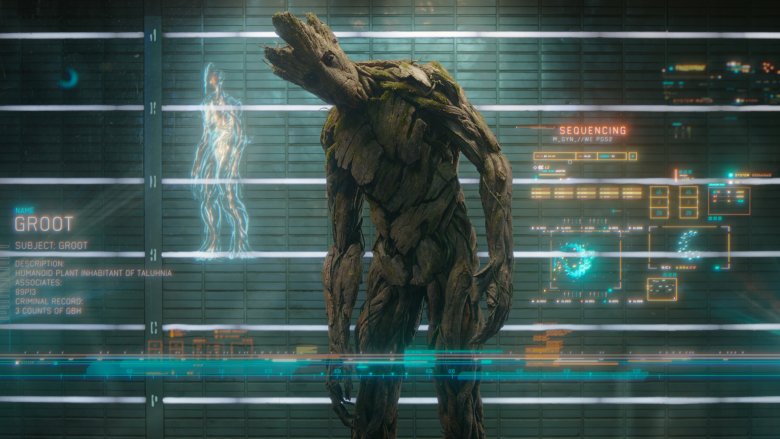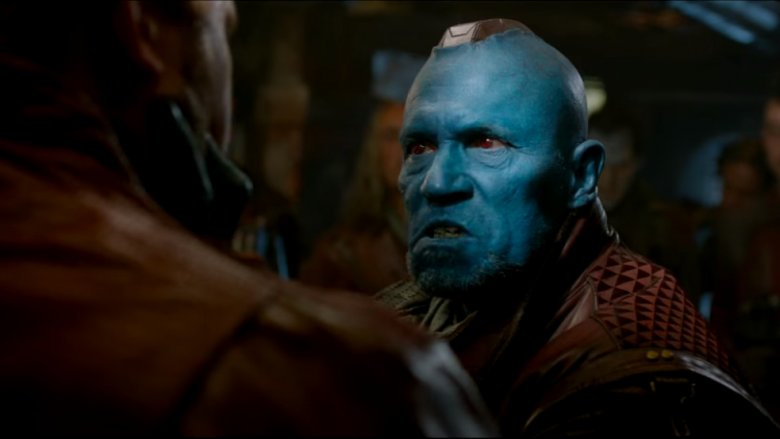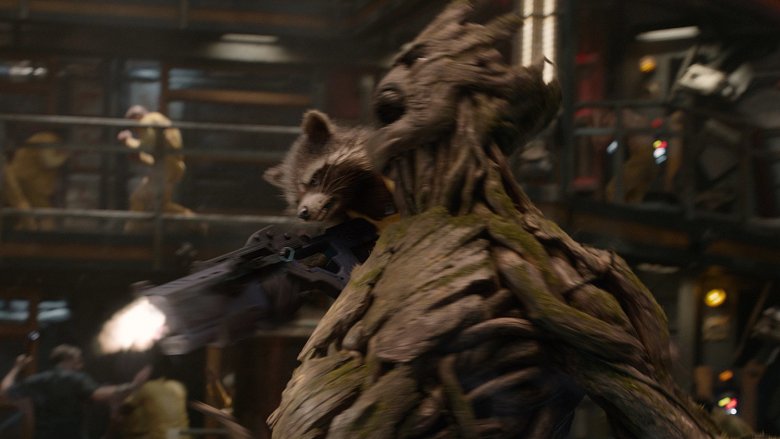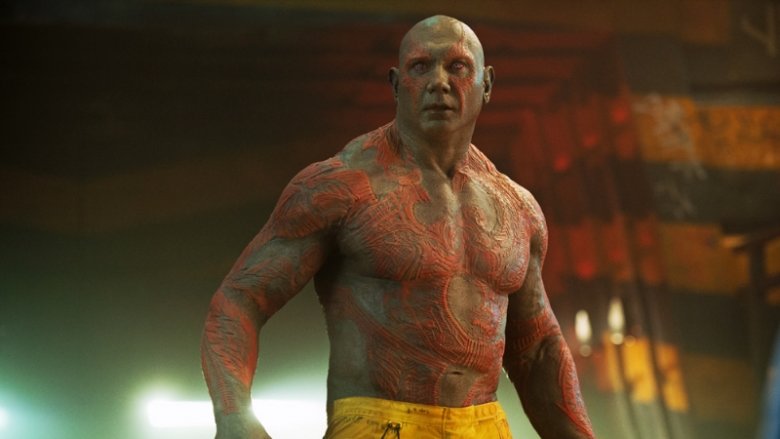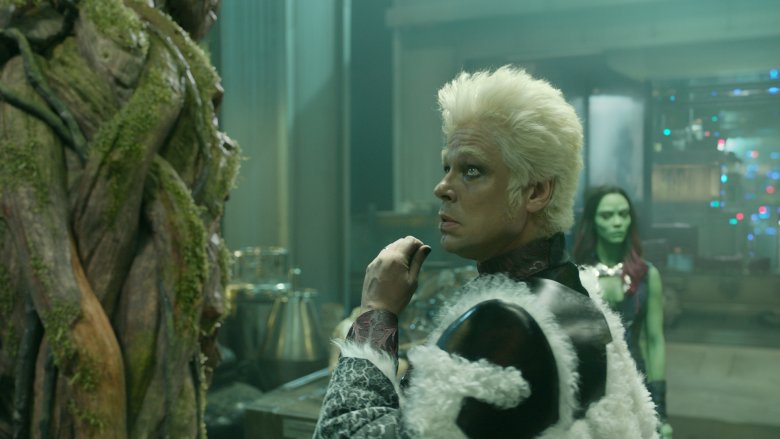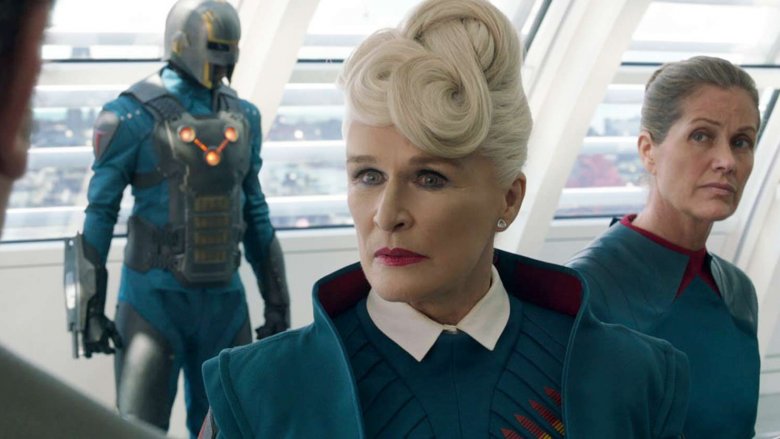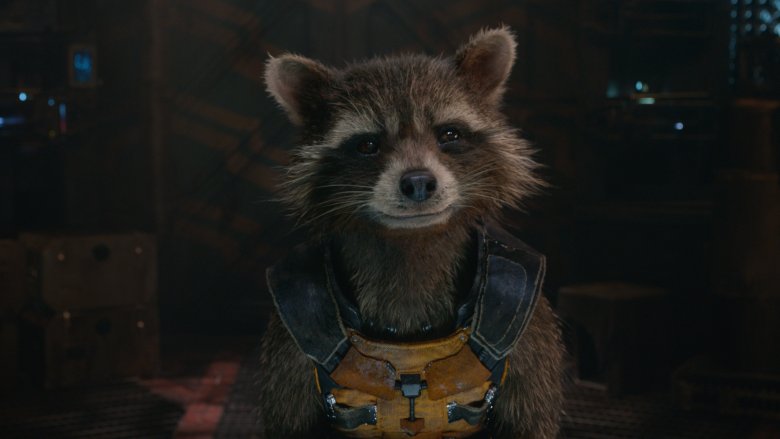Guardians Of The Galaxy Details That Only Adults Notice
One of the joys of the Marvel Cinematic Universe is its ability to entertain different groups of moviegoers in different ways. Each film in the MCU, if done right, is the kind of movie that whole families can watch together. Kids can laugh at the talking tree and stare in wonder at the Hulk as he smashes, while adults can relate to the complex character drama and, of course, the dirtier of the MCU's many, many jokes. Perhaps no other franchise in the MCU exemplifies this better than Guardians of the Galaxy.
Marvel's tale of a group of cosmic misfits coming together to fight a threat they can only face as a team was perhaps the biggest gamble in the MCU at the time of its release, but the film quickly caught on, and it's likely one of the most rewatched films in the tentpole at this point. That means plenty of kids have enjoyed watching Rocket Raccoon do his thing, while plenty of adults have enjoyed... well, a lot of other things. With that in mind, here are things only adults notice in Guardians of the Galaxy.
Peter Quill and Earth
A key component of Peter Quill's character, from the moment we meet him, is his intense connection to his homeworld of Earth. Forcibly taken from the planet as a child and raised among the outlaws known as the Ravagers, Peter left home just minutes after the death of his mother, and was left with only a few possessions to remind him of her, including the "Awesome Mix" she made for him that he listens to virtually nonstop. It's been 26 years since he's seen Earth when we meet him, and Peter is still holding on to the mixtape, his backpack, his Wishing Troll doll, and everything else he has as a reminder of his home, but he's also a capable pilot and well-trained outlaw who knows his way around the galaxy. So... he's definitely tried to go back to Earth, right? Maybe not recently, as he seems to have settled into a life by the time we get to know him, but at some point in his formative years, after he learned to fly a ship, it's almost impossible to imagine a universe in which Peter didn't run away from his Ravager home to find his Earth one again. It might even be a funny story.
The search for other Terrans
Speaking of Peter Quill and his relationship to Earth, another interesting aspect of the film's structure that is only mentioned in passing is the relationship the rest of the galaxy has to Quill's home planet. The film doesn't tell us exactly how far away places like Xandar and Knowhere are from Earth, but they're close enough that Yondu and his boys were able to fly there and abduct Peter on the day his mother died. Now, Yondu is pretty good at his job, but he's not so elite and brilliant that he's the only one who could find Earth and track down Peter for Peter's father. Yondu says the other Ravagers have never "tasted Terran before," but at the very least they seem to know what a Terran is. And yet, we never (until the second film, anyway) see any sign of another Terran or even another scrap of Terran popular culture or history anywhere Peter goes... save one: Cosmo the Space Dog, who resides in the Collector's museum on Knowhere. That means it's clearly possible for someone or something to even accidentally travel from Earth to the other side of the galaxy, and yet it seems to be rare enough that Peter is considered, if not unique, then at least special. Maybe the Ravagers should make a return trip and visit McDonald's or something.
Alien sex is all the same?
Peter Quill fits neatly into the category of "lovable scoundrel" as a character, and one of the traits that helps grant him that label is his apparent tendency toward meaningless sex with all manner of alien species. He has a woman, whose name he's forgotten, in his ship when we first meet him, he hits on Gamora when he sees her, and later he tells Drax various stories about alien women who've attacked him after he had sex with them and tried to skip out or otherwise betray him. There's nothing particularly new about this element of sci-fi. It's been around for a long time, and whenever it comes up — particularly when it comes to Captain Kirk in Star Trek — we have to ask the same question: Do sex organs just universally work the same way for any alien with two legs? It doesn't really matter to the story here, and Peter has no occasion to elaborate, but he also tells a story about flirting with a woman who had "tentacles and needles for teeth," who he wasn't interested in but spent time with anyway in a quest for information. What would have happened if he'd taken that interaction further? Maybe we're better off not knowing.
Thanos: Laziest supervillain ever
Avengers: Infinity War had to present us with an image of Thanos as a supervillain who could be not just a mastermind, but a punishing and relentless force unto himself. This was a pretty tough task, in part, because of the way Thanos is depicted in his previous film appearances — most notably Guardians of the Galaxy. As he did in The Avengers (though we didn't know it at the time), Thanos sends someone else — Ronan the Accuser — to obtain an Infinity Stone for him, and spends all of his time seated on a floating throne, hurling threats and giving orders but never actually showing the audience why he's so dangerous and so worth listening to. It definitely works in the context of the larger MCU, but if you were to watch this film and only this film, you'd essentially just be taking everyone at their word that Thanos is a bad dude. According to what happens in this movie alone, he's basically a guy who tells everyone else to go do something for him while he kicks back and gets irritated when they fail. And they listen for... reasons? No wonder Ronan decided to strike out on his own when he realized he had an Infinity Stone in his possession.
The power of Yondu's whistle
Guardians of the Galaxy is full of interesting space technology, including weapons, and perhaps none is more visually intriguing than Yondu's Yaka Arrow, the incredibly sharp and fast weapon he controls via whistling and a device on his head. In one of the film's most amusing fight scenes, Yondu slaughters a whole group of enemies while never moving, just using his extremely controlled whistle to guide the arrow around until everyone is dead. It's a neat piece of technology, and while it's certainly very effective in its current form, it's hard to watch the Yaka Arrow in action and wonder why Yondu — or whoever else might be involved in such a weapon — isn't thinking bigger. Sure, the Arrow is elegant, but what about a rocket launcher that works the same way, or a drone, or a whole ship? Perhaps it requires more mental energy and control than Yondu's whistle can summon to operate anything other than the arrow, but with tech like that, it's hard to imagine no one's ever tried.
Peter's audio preservation skills
Peter's trusty Walkman, and the mixtape contained within it, are more than just an important part of his personal identity and his attachment to the memory of his mother. As the marketing campaign for Guardians of the Galaxy ramped up, that tape and the music on it became one of the essential hallmarks of the film. It's embedded in the very fabric of the Guardians of the Galaxy franchise, so much so that when he has to escape the Kyln prison, Peter risks his life and his freedom just to get the tape back.
It's not just a killer soundtrack, it's a moving symbol of his love for his mother — but the more you watch the movie, the more you realize that Peter has somehow kept that Walkman and its headphones in perfect working order for a quarter of a century, and somehow the tape still sounds great even though he's clearly been playing it constantly. Anyone who grew up in the age of cassette tapes knows that's exceedingly unlikely. Plus, he somehow managed to get a tape deck somewhere and install it on his ship. Either Peter Quill learned some really good audio technician skills before he left Earth, or he Knows a Guy in space who's able to hook him up.
Groot's growth
Guardians of the Galaxy made movie stars out of TV star Chris Pratt and wrestling star Dave Bautista, but if you have to pick one single breakout superstar from the film, it could very well be Groot, the sentient tree-like creature voiced by Vin Diesel. Groot is physically imposing, but compassionate and kind. He's verbally limited, but wise. He's also just plain adorable, and all of these things make him a fascinating character. If you hold that fascination for Groot long enough, though, you notice that his abilities throughout the film are rather... fluid.
It's established early on that he can grow back limbs and instantly extend his height by several feet. During the film's final battle, he unleashes a swarm of glowing spores, impales several enemies on his arm (which he's just turned into a spear), and turns himself into a spherical cocoon of vines and leaves to save his friends as the ship they're on crashes. This is all very cool, but it also raises a lot of questions. If Groot can basically take any shape he wants, why did he decide on that height and build? Why doesn't he have a flower growing out of the top of his head at all times? If you ask him, he'll probably just say "I am Groot."
The Ravager diet
Peter is abducted from Earth as a boy by the Ravagers, a group of outlaws with their own code and system of command who were hired by Peter's still-mysterious father to bring him back. Yondu (Michael Rooker), the leader of this particular faction of Ravagers, decides to keep Peter, take care of him, and teach him how to be an outlaw. Whenever Peter expresses annoyance at Yondu, or disobeys or flat-out betrays him, Yondu reminds him of this, and even goes so far as to tell Peter, more than once, that he saved him from being eaten by his fellow Ravagers.
"They ain't never tasted Terran before," Yondu says, referring to the time when Peter was a boy and the other outlaws were curious about what he'd taste like. It's a story that's simply meant to show how much Yondu feels Peter owes him, but it raises a question the film never answers: Do Ravagers just eat whatever they want, even if it can talk? They're made up of all manner of alien species, so does that mean they would eat each other if they wanted to or were pressed into it by desperation? It's not clear, but what is clear is that the diet of a Ravager is probably quite interesting.
The magic of zero gravity
When the team is taken to the Kyln prison, it's up to Rocket to come up with a plan — and what he comes up with actually ends up working pretty well. The key moment that the whole plan hinges on involves the team getting up into the guard tower, turning off the artificial gravity in the prison, and then detaching the compartment from its pedestal so they can simply float out to their ship and fly away. It's a good idea, but it also involves at least one very large chunk of luck.
For some reason, when the artificial gravity goes off, the Kyln guards — many of whom had previously been holding riot shields and rocket launchers — drop their weapons and just start madly flailing around as they float. At no point do they ever seem to recover even a little bit while the Guardians make their escape. Now, of course there would be a certain element of surprise if gravity suddenly went away, but it's weird that the guards at the super-secure space prison apparently never received any training for what to do if the artificial gravity failed. Plus, you'd think at least one of them would have picked up a gun again at some point after the initial shock wore off.
Drax's very fluid literal mind
Drax the Destroyer, we're told, comes from a species who are completely literal, which means metaphors and idioms go over his head (although he insists "Nothing goes over my head! My reflexes are too fast"), which makes for some interesting conversational and comedic moments. The trouble is, sometimes Drax's literal-minded reactions only come when the film deems it interesting; at other times, he either ignores certain phrases or even uses expressions that a literal person wouldn't.
He doesn't understand what it means when Peter drags his finger across his throat to mime killing someone, but says nothing when Peter tells the whole team to "give a s***" (we should probably be grateful for that). In one of the film's more controversial moments, he calls Gamora a "whore," despite never seeing or hearing her do anything that would indicate she's a sex worker. It's possible he just doesn't know the literal meaning of that word, but it's more likely that he meant to use the word in that context because, as the daughter of Thanos, he's used to not liking Gamora very much. Either way, it's a lapse in the way we're told his mind is supposed to work.
The Collector's procurement preferences
With the Orb in their possession, the Guardians realize they need to dispose of it before it falls into the wrong hands, and Gamora's plan is to sell it to the Collector, an ancient and powerful being who... well, collects things. If they give it to him, she reasons, they can both no longer be responsible for it and get paid enough money that they can all disappear and live comfortably forever. The Collector is happy to oblige, but while the group is in his home he notices something else he'd like to buy: Groot.
Intrigued by the specimen standing before him, the Collector says "you must allow me to pay you now so that I may own your carcass... at the moment of your death, of course." While it's certainly nice of him to pay up front and wait for Groot to live a full life before owning him, the film also makes it pretty clear that the Collector has no such scruples about other specimens in his collection. Numerous living, seemingly sentient things are visible in his display cases, including Howard the Duck. Did he just not care to wait for them to die? We're left wondering.
Ronan vs. The Nova Corps... or not
The very first thing we see Ronan the Accuser do is kill a Xandarian citizen and member of the Nova Corps. In doing this, Ronan makes his motives very clear: He is not honoring the peace treaty signed between the Xandarians and the Kree. He still sees Xandar as a disease that poisons the galaxy, and wishes to continue the seemingly endless war between their people that their governments just ended. Ronan is a fanatic, and in refusing to honor the treaty his own government just signed he has become an intergalactic terrorist, preparing a plan that will ultimately lead to the destruction of Xandar and everyone who lives there.
Xandar isn't unprotected, though. The Nova Corps has significant manpower, and when Ronan finally flies the Dark Aster toward the planet's surface, they spring into action. It turns out to be too little, too late, but the Guardians still manage to save the planet. Their victory aside, this all brings to mind an interesting question: Why didn't the Nova Corps take a more proactive approach to dealing with Ronan? His existence wasn't a secret. He wasn't exactly a covert operative, and the Nova Corps clearly have the resources to capture fugitives and send them to prison. Were they trying to capture Ronan and we just didn't hear about it? Were they taking a more laid back approach, or is Ronan really supposed to be that scary even before he gets the Infinity Stone? We may never know.
What's a raccoon?
When the Guardians are being taken to the Kyln, Quill calls Rocket a raccoon. Rocket replies "What's a raccoon?" When Quill assures him that he is, in fact, a raccoon, Rocket replies "Ain't no thing like me 'cept me." Just moments later, Quill sees Rocket's bare back as he's exiting the prison shower and notices a few devices embedded in the creature's skin, indicating some kind of experimentation in his past. Then the film just... moves on. Rocket's past isn't given much time in the film, but we know he's very sensitive about not being treated like an individual and being treated like an animal. In his comic book origins, Rocket is from a place called Halfworld, and is the project of genetic engineering that made him and several other animals (including a walrus named Wal Rus) able to talk and care for the mentally ill people who were sent to Halfworld to live in a colony. That's why he walks upright and has all the intelligence of a human. Rocket wasn't just created out of thin air, though, which does suggest other raccoons somewhere in the vicinity of his origins, or at least a level of awareness that would allow him to figure out his species. So, either Rocket really is the only raccoon to have ever made it this far out into the galaxy, or he's just so self-important that he doesn't care to find out if there's anyone else like him. We're betting on the latter.
